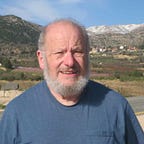How To End The Toilet Wars
There’s an ongoing battle about what the rules should be about those spaces labelled “Men” and “Women”. For instance, should someone born with male genitalia but who self-identifies as female be permitted (or required!) to use the restroom labelled “Women”?
If you’ve ever been to a state fair, you probably noticed a line of port-a-potties. These facilities aren’t labelled “Men” and “Women” because they don’t need to be. Many restaurants in Europe don’t have separate facilities for each gender either. As long as the individual toilets have full-height partitions between them, there’s no need for separation by gender. Interestingly, the standard port-a-potty also includes a urinal. Building codes don’t require separate facilities for men and women as long as there’s an adequate number of “water closets”.
In the United States it’s customary for buildings to have separate men’s rooms and ladies’ rooms but it’s not required, a fact that many people aren’t aware of. It doesn’t even save expense for builders; an enlarged unisex toilet facility obviously costs less to build than two separate facilities. In fact, the existing arrangements can pose a problem for people with small children. Is it all right for a man to accompany his three-year-old daughter into the ladies’ room? Or should he bring her with him when he goes into the men’s room?
Admittedly it isn’t easy to adapt the concept of unisex toilets to existing buildings, but it’s still usually possible with some reconfiguration. For instance, if the men’s room and the women’s rooms have just a wall between them, the wall might be removed and the two facilities combined. There’s no reason, other than social inertia, for new construction not to provide unisex toilets. And doing that universally will make life easier for a lot of people. Something I just discovered is that schools in Ireland already have unisex toilets!
